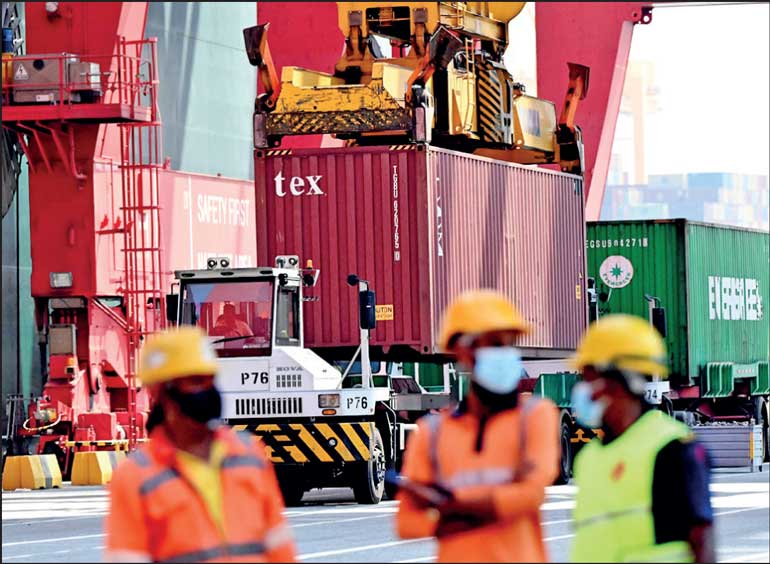Tuesday Feb 17, 2026
Tuesday Feb 17, 2026
Wednesday, 1 March 2023 00:58 - - {{hitsCtrl.values.hits}}

Sri Lanka›s external trade had begun the New Year 2023 on a negative note with exports and imports declining year on year as confirmed by Central Bank data yesterday.
Exports in January declined by 11% to $ 978 million year on year and was also lower in comparison to $ 1.07 billion achieved in December 2022.
Imports had plunged by 29% year on year to $ 1.38 billion in January whilst it was lower compared to $1.42 billion in December 2022. January saw a decline in expenditure in all sectors with dip in intermediate goods contributing the most.
The deficit in the merchandise trade account narrowed to $ 410 million in January 2023, from $ 857 million recorded a year ago due to a larger decline in imports, compared to the decline in exports. However, the merchandise trade deficit in January 2023 widened, compared to the deficit of $ 358 million recorded in December 2022.
The Central Bank said the dip in exports in January was a continuation of the moderation observed since September 2022, though at a slower pace than expected.
“This decline was observed across all main categories, and the compression of industrial exports was noticeable,” it added.
Earnings from the exports of industrial goods declined by 12.4% to $ 781 million in January 2023, compared to January 2022, with the greatest share for the overall decrease being contributed by garments (down 19% to $ 389 million) resulted from lower demand in most of the major markets (the USA, the EU and the UK).
Earnings from the export of agricultural goods declined by 6.6% to $ 191 million in January 2023 driven by lower export volumes of fibres and desiccated coconut, categorised under coconut related products.
Earnings from mineral exports declined by 16% to $ 3.6 million mainly due to the decline in exports of quartz and natural graphite powder.
The export volume index increased by 5.3% (y-o-y), while the unit value index declined by 15.7% (y-o-y), in January 2023, indicating the decline in exports earnings was contributed by lower export prices.
Expenditure on the importation of consumer goods declined 39% to $ $ 218 million in January due to the decline in both food (by 37% to $ 118 million) and non-food consumer goods (by 42% to $ 100 million).
Decline in import expenditure on non-food consumer goods was mainly driven by the reduction in the import of medical and pharmaceuticals (due to the base effect of higher expenditure on COVID vaccines in January 2022). Expenditure on food and beverages also declined due to lower cereals and milling industry products (mainly, rice), compared to that of January 2022.
Expenditure on the importation of intermediate goods declined 20% to $ 970 million in January driven by lower imports of textiles and textile articles (primarily, fabrics) indicating lower garments exports in the period ahead.
In contrast, expenditure on fuel, the largest import component under this category, increased 11% to $ 481 million due to higher volumes of crude oil (84% to $ 107 million) and coal imports (43% to $ 86.4 million), although expenditure on refined petroleum declined (due to lower volumes) compared to January 2022.
Import expenditure on investment goods declined by 48% to $ 199 million in January as almost all types of goods listed under all three main investment goods subcategories, namely machinery and equipment, building material and transport equipment, recorded a decline.
The import volume and unit value index declined by 13.3% and 18.3% (y-o-y), respectively, implying that the decline in import was resulted by both the volume and unit value effect.
Terms of trade, i.e., the ratio of the price of exports to the price of imports, improved by 3.1% in January 2023, compared to January 2022, as the decline in the prices of imports surpassed the decline in the prices of exports.
